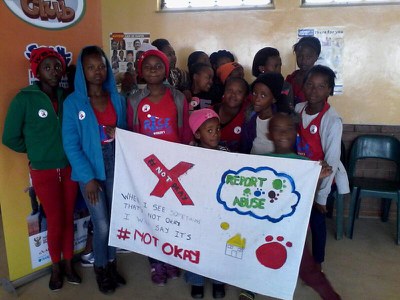It also encourages the society to speak out because the solution lies with us.
Revolution RYWC organised informal community dialogues where stakeholders were invited to share their knowledge regarding the Violence of Women and children within the communities we live at. The club invited the following stake holders with their roles:
- Dineo Makhetha – Qholaqhwe Advice Centre
The speaker’s focus was on the impacts the abuse in the community has on our daily lives. She indicated that it’s not the victim fault to be abused but it’s a victim fault to keep quiet and not report the abuse. She explained the ways a person need to take when s/he is abused and also encouraged participants to always speak if they experience the abuse and never judge victims but do help them to get help. - Sarah Nhlapo- Qholaqhwe Advice Centre
Her focus was on types the abuses that most women and children experienced. She also mentioned that Bullying that often happens at schools is part of the abuses that children experience. In this festive season she encourages children to be careful since it’s the season with most human trafficking cases. - Seeiso Motubatsi – Barona Bana Association
Her focus was on the rights of children and responsibilities. She mentioned that many children don’t understand their responsibilities as a result it increases the abuse that are often happens in the communities. She indicated that it’s not children’s role to babysit their young siblings while their parents are going to party. She concluded by saying the participants should support the theme of saying “it’s not; when I see something that’s not okay I will say it’s not okay”.
Here are some of the activities that Revolution RYWC did for the campaign of 16 Days of No to violence against women and children:
- Maleka Nteboheng gave a message of support from the club, encouraging the community to speak out and be committed in becoming part of the solution to reduce violence and abuse. She mentioned that children should always be careful when choosing their role models because children see and children do what their role models are experiencing in their daily lives.

